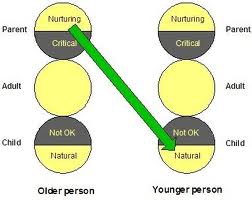Transactional Analysis overview
“The eternal problem of the human being is how to structure his/her waking hours”
Eric Berne, Games People Play
Transactional analysis, commonly known as “TA” to its adherents, is an integrative approach to the theory of psychology and psychotherapy. It is described as integrative because it has elements of psychoanalytic, humanist and cognitive approaches.
TA was developed by Canadian-born US psychiatrist Eric Berne during the late 1950s.
TA is designed to increase the communication effectiveness of individuals: just as we can make a financial transaction, TA examines the social transactions we make with one another on a daily basis.The concepts are a combination of Rogerian and Freudian personality theories.
The main goals of Transactional Analysis as a framework are to learn to analyse our relationships with one another in terms of TA and to develop our ability to engage in straight, effective communication with one another on a daily basis.
The Ego State Model
As a theory of personality, TA describes how people are structured psychologically. It uses what is perhaps its best known model, the ego-state (Parent-Adult-Child) model to do this. This same model helps explain how people function and express their personality in their behaviour. At any one time we are in one of three possible emotional states: adult, parent or child. If we become aware of our feelings, then we have a choice of which state to be in. Without this awareness, we automatically occupy the state that we have learned from the traditional behaviour patterns in our families.
Child State
The natural child state contains all the basic, raw emotions that we feel: anger, fear, sadness, fun, affection, love. These in turn produce basic behaviours; eg tantrums, rebellion, tears, hugs, laughter.
The adapted child state contains all the behaviours or defence mechanisms we had to learn as children in order to survive, behaviours that resulted from our natural child’s needs not being met. These behaviours include: trying to please, apologising, being dependent, passive anger (sulking, delaying, withdrawing, being bored).
Parent State
The parent state contains all the rules, values and morals we learned from our parents.
The critical parent state has all the negative, judgemental, severe behaviours: giving moral lectures, being dominant, telling what to do, not allowing freedom.
The supportive parent state has all the positive parental behaviours: comforting, supporting, holding, making supportive suggestions.
Adult State
This is the state that is not ruled by emotion; it is rational and logical, working with the facts. This is the best state in which to plan, consider, decide and act. It is also the only state in which we can learn something new about ourselves. (That is why no-one ever changes their mind during an argument.) We have to be in an adult state to listen effectively to another person’s point of view; to consider new facts; to evaluate our behaviour.
We unconsciously choose our feelings: no-one makes us feel anything. Once we consciously consider our feelings, we can make a conscious choice: to act on them or not. To move into adult state from the parent or child position, we have to recognise our emotional state in the first place and then, using rational thought, make a conscious decision to change.
More information and further reading
For more information on some of the TA theories, and lots of other models, take a look at:
- This Transactional Analysis Overview goes through the Ego states Model, the “Drama triangle” and the “OK Corral”
- The International Transactional Analysis Association
- “Businessballs.com”: a brilliant free site with overviews of all sorts of theories and models
- Eric Berne and the history and description of TA
“Awareness requires living in the here and now, and not in the elsewhere, the past or the future.”
Eric Berne, Games People Play
